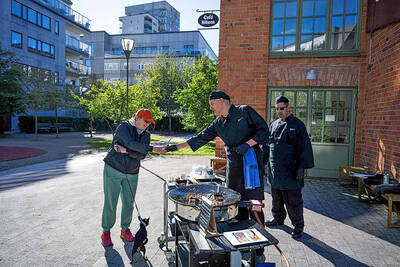For the first time since taking office, US President Barack Obama will see his Guantanamo policy tested before the US Supreme Court after 14 Chinese Uighurs detained without charge lodged a petition for their release.
The nine justices will decide this summer whether to hear the case that was filed on Monday by the men asking the country’s high court to lift a bar imposed on their release by a federal court of appeals.
The 14, members of the predominantly Muslim and Turkic-speaking Uighur minority who were captured in Afghanistan in late 2001, have been cleared of accusations that they were “enemy combatants.”
The case has become a major political headache for the Obama administration, which has sought to avoid a major diplomatic bust-up with China at the same time as unpicking detention policies of the preceding administration of former president George W. Bush.
Should the court opt to hear the case it could find itself embroiled in the establishment of new rules governing the detention of terror suspects, analysts said.
“What is at stake, ultimately, could be the fate of many, if not most of the more than 240 prisoners still at Guantanamo, who might have to remain confined there or somewhere else even if the government decides that they are not dangerous enemies,” said Lyle Denniston, founder of the Scotus blog which follows and discusses Supreme Court cases.
Although Obama has launched a wide-ranging review of policy on Guantanamo, individual cases have been moving through the court system ahead of its completion, including the Uighur case.
In October, federal judge Ricardo Urbina ordered the release of 17 Uighurs to US soil, but in February that decision was overturned. Three men have since asked lawyers not to continue their case.
A court of appeal had ruled the executive branch was the only body with the power to release the men, who are challenging their detention through a Habeas Corpus writ.
Now the Supreme Court has been asked to rule on whether a federal court can order the release of the prisoners in the US.
“The question presented here is whether the third branch may check the second at all,” the Uighurs’ lawyers argued in Monday’s petition. “If Habeas [Corpus] review may be shelved because one president may some day undo what his predecessor did, then the law is whatever the sitting president says it is, and the judiciary is the handmaiden of the political branch.”
Susan Baker Manning, a lawyer for the group, said that the appeals court opinion was “directly defiant of the Supreme Court case law on Guantanamo.”
“The Supreme Court made it crystal clear that you have habeas if you are in Guantanamo,” Baker Manning said.
The Defense Department and the State Department have tried unsuccessfully for several years to arrange the transfer of the Uighurs to a third country.
The Obama administration has said it “cannot imagine” sending the inmates back to China.
Beijing regards the men as “Chinese terrorists.”
Baker Manning said a diplomatic solution could be found “for the vast majority” of Guantanamo detainees, but that the case of the Uighurs is “highly political.”
“China made clear to any country in the world that it would not be in their interest to take these men,” she said.

READINESS: According to a survey of 2,000 people, 86 percent of Swedes believe the country is worth defending in the event of a military attack Swedes are stocking up on food items in case of war, as more conflict in Europe no longer feels like a distant possibility, and authorities encourage measures to boost readiness. At a civil preparedness fair in southwest Stockholm, 71-year-old Sirkka Petrykowska said that she is taking the prospect of hostilities seriously and preparing as much as she can. “I have bought a camping stove. I have taken a course on preservation in an old-fashioned way, where you can preserve vegetables, meat and fruit that lasts for 30 years without a refrigerator,” Petrykowska said. “I’ve set aside blankets for warmth, I

FRUSTRATIONS: One in seven youths in China and Indonesia are unemployed, and many in the region are stuck in low-productivity jobs, the World Bank said Young people across Asia are struggling to find good jobs, with many stuck in low-productivity work that the World Bank said could strain social stability as frustrations fuel a global wave of youth-led protests. The bank highlighted a persistent gap between younger and more experienced workers across several Asian economies in a regional economic update released yesterday, noting that one in seven young people in China and Indonesia are unemployed. The share of people now vulnerable to falling into poverty is now larger than the middle class in most countries, it said. “The employment rate is generally high, but the young struggle to

ENERGY SHIFT: A report by Ember suggests it is possible for the world to wean off polluting sources of power, such as coal and gas, even as demand for electricity surges Worldwide solar and wind power generation has outpaced electricity demand this year, and for the first time on record, renewable energies combined generated more power than coal, a new analysis said. Global solar generation grew by a record 31 percent in the first half of the year, while wind generation grew 7.7 percent, according to the report by the energy think tank Ember, which was released after midnight yesterday. Solar and wind generation combined grew by more than 400 terawatt hours, which was more than the increase in overall global demand during the same period, it said. The findings suggest it is

‘ARMED CONFLICT’: At least 21 people have died in such US attacks, while experts say the summary killings are illegal even if they target confirmed narcotics traffickers US forces on Friday carried out a strike on an alleged drug-smuggling boat off the coast of Venezuela, killing four people, US Secretary of Defense Pete Hegseth said. The latest strike, which Hegseth announced in a post on X, brings the number of such US attacks to at least four, leaving at least 21 people dead. An accompanying video shared by Hegseth showed a boat speeding across the waves before being engulfed in smoke and flames. “Four male narco-terrorists aboard the vessel were killed,” the Pentagon chief wrote. He said the strike “was conducted in international waters just off the